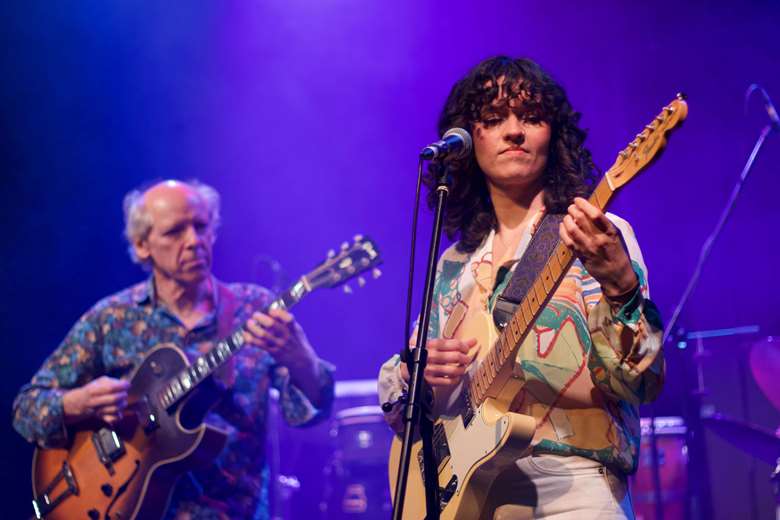Taking Off: Hejira
Peter Jones
Tuesday, February 20, 2024
The band Hejira, who perform covers of Joni Mitchell’s jazzier material, are no mere tribute act. Instead they offer entertaining new insights into some extraordinary music. Peter Jones meets the group’s leader, guitarist Pete Oxley, and singer Hattie Whitehead

Guitarist Pete Oxley has run The Spin jazz club in Oxford for 25 years. In 2022 he conceived the idea of presenting a Joni Mitchell special for Christmas. After all, in about a year it would be Mitchell’s 80th birthday.
“I’ve loved the music of Joni since I was about 21, when I heard Blue,” he explains, “and then I got on to the jazz records when I was a music student at Leeds and heard Hejira and Shadows and Light, and they just blew me away.”
Him and many others. The live Shadows and Light album featured a jaw-dropping band: Pat Metheny, Lyle Mays, Jaco Pastorius, Don Alias and Michael Brecker. Oxley decided to put together a parallel ensemble - plus a percussionist - that he named Hejira, after Mitchell’s jazz-inflected 1976 studio album.
Singer and guitarist Hattie Whitehead fronts the band, with a voice stunningly like Joni Mitchell’s, although she resists any suggestion of simply ventriloquising, citing James Taylor and John Martyn as equally important influences.
“It’s not really intended to sound anything other than how I would naturally sing. I’ve just grown up with Joni Mitchell from a baby, so she’s become a part of the making of me as a musician and a songwriter. I’ve had conversations with people after gigs who have said, ‘It’s amazing - you close your eyes, and it’s like you’re listening to Joni.’ But it’s not intentional. My natural voice is not being changed.”
In fact, Whitehead’s lack of formal voice training is probably what helped shape its character.
Hejira is a seven-piece band featuring many stalwarts of southern England’s jazz scene: the other members are Rick Finlay (drums), Dave Jones (bass) (Oxley: “I thought he’d be able to interpret Jaco and do his own thing”), Olli Weston (tenor/soprano sax and bass clarinet), Chris Eldred (keys) and the newest recruit, Marc Cecil, on percussion.
With three chord instruments in the band, it’s essential they leave space for each other. “Most of the time,” says Whitehead, “particularly if it’s songs that are being played, with lyrics all the way through, you’ve got to be careful about how much you play, because they can just compete with each other.”
As for the emotions and messages in the songs, she quickly came to appreciate how self-aware and well-rounded Joni Mitchell is as a person and an artist. Her ability to convey emotion is rooted in her femaleness: for example, she has said that she employs a lot of 'sus' chords because they sound unresolved, reflecting her own frequently unresolved feelings.
We discuss the BBC Radio 4 documentary Legend: the Joni Mitchell Story, aired in November-December 2023, as well as a hard-to-find guitar book with all of her distinctive open tunings in it (Joni Mitchell Complete So Far, published by Alfred Music). Mitchell’s guitar roadie Joel Bernstein used to keep her supplied with ready-tuned guitars at gigs. This was less daunting than it sounds for Hattie, who was already playing in several different open tunings before joining the band.
The inevitable question arose: are Hejira simply a tribute act? No, says Oxley immediately. Whitehead considers the term “tarnished”, pointing out that they don’t go on stage in character as the original musicians. “And also everyone’s playing the songs in the way that they would naturally choose to play the songs, they’ve not gone away and learned the solos note for note.”
The idea is to play “in the spirit” of Shadows and Light. “Dave Jones plays some of Jaco’s lines,” concedes Oxley, “and I would miss them if he didn’t play them, because they’re integral.” Audience members are often extremely au fait with the originals, to the extent of coming up afterwards and saying things like “Oh, I’m so glad you played that one bar of ‘Phase Dance’.”
“To me what’s really important about this band is that we’ve got a bunch of jazz musicians who are there to serve the songs,” he adds. “We’re not there to grandstand.”
Says Whitehead: “The originality is in the way that you perform the song – you make that performance your own. The more we play this repertoire, the more meanings pop out in the lyrics that I can apply to my own existence, and that’s the original thing we’re doing. We’re enjoying it as ourselves doing it rather than pretending to be someone else playing the songs, which is what I imagine a tribute band’s thing to be.”
Musically, Hejira have the potential to appeal not only to jazz audiences, but to rockers and folkies too, with all the opportunities that suggests for performing at a wide range of Summer festivals.
Hejira’s first gig of 2024 is on 26 February at London’s Jazz Cafe, followed by dates across the country from Falmouth to Edinburgh. Meanwhile we recommend Hejira’s spellbinding live performance of Mitchell’s ‘Black Crow’ on YouTube.
This article originally appeared in the February 2024 issue of Jazzwise. Never miss an issue – subscribe today



